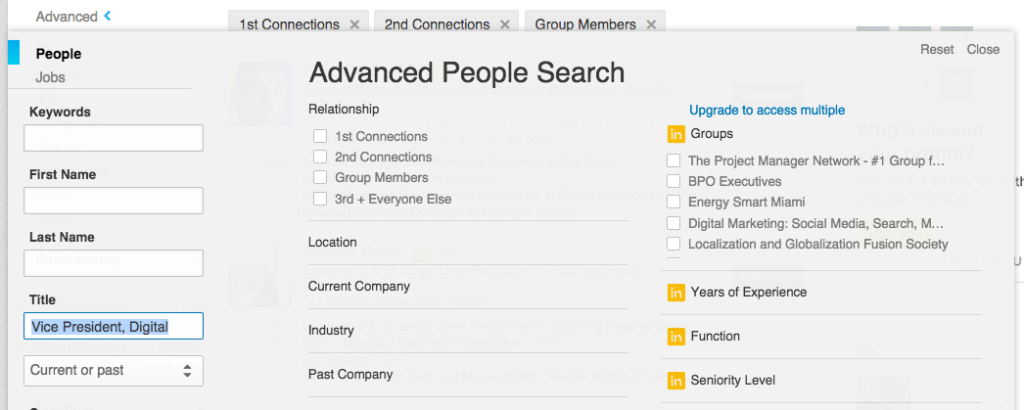Social Media Predictions and Preparations for 2015
January 9, 2015 | By Dennis Stoutenburgh+ | No Comments
This year began on a disappointing note for Facebook. Headlines even went as far as declaring that Facebook - once considered the Goliath of all social networks - was now “dead.”
Additionally, Brian Boland, VP of Ads Product Marketing for Facebook recently discussed news feed algorithm changes, stating that “With more content generated by users, businesses, and groups on Facebook, there is far more to show in the same digital space. That means more screening, and more posts that will never be shown automatically on someone’s timeline.”
With a reported number of diminishing number of users, and changes that hinder organic reach, how should businesses prepare for its demise on Facebook?
Whether businesses are just getting their start on social media or already using its valuable data produced by users or other competitors, we’ve tapped 9 digital marketing experts from a range of industries for insights on how to get the most out of social media in 2015. Below are 3 questions, and their answers to provide you with this year’s social media predictions and preparations.
1. How can marketers prepare for the demise of organic reach on Facebook?
Getting more “active” fans on Facebook isn’t all that complicated, but it does depend upon your definition of “active.” For me, “active” means people who visit and read the content there, whether that be informational, thought leadership, event-related content or conversation.
What most business owners don’t realize is that those who simply visit and read—aka, the lurkers—are the ones who are really important to scale. While they might not participate directly, they do so vicariously through the visitors who do participate and via the content they come to see.
To get people to visit your Facebook page more often, you have to give them a reason to be there by adding value, interacting and engaging with those who visit, and by building relationships. Empower your employees to help you scale your content and conversation, and for heaven’s sake, make it a requirement or give incentive for employees to visit the pages of your fans - especially those in the marketing department.
Get inside their heads a bit, and report back about what they’re talking about and what’s of interest to them. Do this with your competitors as well!
Have employees link to your Facebook page in the “About” section of their own Facebook profiles. Seek out groups that fit your company niche and encourage employees to join. You’re not doing this to spam others with your messaging, but to find ways to contribute, answer questions, share expertise and learn.
I’ve been asked by a lot of people how they can be more successful in building relationships on social channels and on Facebook in particular. And the one thing that keeps coming to the surface is the importance of being “present” when you’re being “social.”
Ted Rubin
It’s all about content. The better the content you write and generate the better your search results. Google has gotten extremely smart to avoid gaming the system. Machines and technology are learning and predicting more each day so we will need to increase the value of our content by making it engaging and relevant to our audiences.
Paul McNeal
In 2015 you need to allocate a budget for Facebook advertising. The reach is low for most businesses and always will be. If you want your content to appear on the top results of Google you either have to work really hard or pay for advertising. The same applies to Facebook.
Ian Cleary
You build out referral and advocacy marketing programs that reward those who have already put trust in your company. This can be done through guest blogging, email, and sponsored updates.
Adam Sherman
Organic reach is a challenging aspect of all marketing campaigns, and social media is no different. Anyone with a budget can buy traffic or users, but it takes a marketer who understands the psychology of the user to grow something organically.
As more marketers attempt to stand out among the crowd by creating more and more content to earn the mind share of users, saturation in the middle of the value curve will become greater. This will make it more difficult for “average content” to surface and be found organically.
Standing out is rooted in 3 variables:
- Planning: Understand what your users need and want.
- Focusing on value: Place more importance on reaching the credible mass than reaching a critical mass (quality over quantity).
- Thinking and doing things differently: Be unique with your approach and how you create value. If you do what everyone has always done, you will get what everyone has always got.
Bill Ross
Moving into 2015 if you don’t have budget for paid advertising in social then you are simply missing opportunities. Marketers need to find the right balance for paid social split between awareness, lead gen, thought leadership, and PR. Bottom line: organic is good, paid is better.
Jason Miller
2. Why will social data be important?
Social “data’ is the missing piece in search data that completes the picture, but don’t forget all the opportunities that exist for you to create your own view of the consumer simply by visiting their pages instead of waiting for them to visit yours. The opportunity to learn and engage on their pages is a totally untapped resources by most marketing teams.
Ted Rubin
Social data provides an unprecedented look into our relationships. Social data provides the marketer with information that before would be almost impossible to get on this scale.

Leveraging information from relational interaction is tremendously valuable. With this type of data – cold calls should never happen.
Paul McNeal
Build their email list. It’s great having Facebook fans and Twitter followers, but more conversion happens through email. Keep building your social media presence, but look for ways of converting them to email subscribers.
Ian Cleary
Social data will continue to be important as conversations and user behavior will increase in complexity. Because many of our friends and family are now on social media interacting in some way or another we’ll see social data provide context for actions and next steps for many organizations large and small.
We can also assume social data will play a large role in content creation and as we grow the social media ecosystem (through the popularity of sites like Snapchat, Instagram, etc) we’ll see the influence of mobile and social on much of web interaction and we can use analytics and social data to help us predict behavior trends and next steps.
Danielle Brigida
I would say insight derived from the social data can help to further increase a company’s management and careful anticipation of the cross-touch point customer journey.
Adam Sherman
As the saturation of average content increases, using data to pluck the gems and define a strategy will separate the winners from losers.
There are 3 reasons social data will become important in 2015:
- The need to understand the user
- The need to define value
- The need to be agile enough to iterate
Bill Ross
Why social data will be important in 2015? Social data helps inform marketers about shifts and trends in their customer base, and is often an early indicator. If you can interpret this information quickly and react swiftly, you will likely out maneuver competition.
Alex Avendano
Why social data will be important in 2015? – Marketers who can pull actionable insights from social data to better personalize their campaigns and create more relevant content to fuel those channels will be the big winners.
Jason Miller
3. What initial steps should social media newcomers take?
Start now, don’t wait for a formal strategy. Get in the mix and start observing, reading, interacting and engaging.
I believe that Instagram is incredibly valuable as a relationship builder and as an indexer of social content. It is also so easy for the beginner to use and create content anytime and anywhere. In addition, syndicating Instagram content to other channels (Facebook, Twitter, Tumblr and Foursquare) can be done with the click of a button. Because it is visual, it works everywhere.
Instagram is about sharing, being social, and including other in your lives/activities. Use Instagram to share images, which allow people the ability to add their own interpretation to what you post. The connection, syndication and relationship building of this tool is invaluable and fun! Keep in mind that hashtags on Instagram play a very important role in gaining visibility. Make sure you use them.
Ted Rubin
Social media provides us an ability to truly reach people we normally would not have been able to reach. In addition if you use the tools property, it will allow you to build relationships that can have a lasting impact on your business.
For the newcomer, pick a channel, get good at it, and then expand. When using social media – please, please, please do not just spam! Take the time to comment on what might connect you to the other person you are trying to reach. The information is there - read and use it to build relationships.
Paul McNeal
Build relationships with people that are relevant to your business and you can’t go too far wrong.
Ian Cleary
If you’re a social media newcomer, identify what value you have to share or bring, whether it’s resources or conversations, and find the platform that supports both your goal and the community at large. Stick to what you have the capacity for and make sure you enjoy yourself and get to know others.
Want to see bald eagles? Winter’s a prime time to do it. Join a tour or explore on your own: http://t.co/alr0lW9Fxy pic.twitter.com/ooHu18CbsX
— US Fish and Wildlife (@USFWSHQ) January 7, 2015
I still see listening as one of the first things you should do on social media, and once you do that you can really begin to understand where there is a place for you to add value and enrich the conversations or community that already exists.
Danielle Brigida
I would say at the outset, now more than ever, reinforcing the care put into 1-to-1 relationships with existing business and creating 1-to-Many relationships is key. Rather than creating 1-to-many out of the gate, I believe my suggestion will help serve all newbies well.
Adam Sherman
It is not as much a set of steps as a list of insight and learnings that newcomers should take to heart in 2015.
- Always be learning: Users expect to be engaged with differently on each social network. Learn the networks and understand what users expect.
- Test everything: The attention span of the user, what they expect, and their mindsets, are evolving faster than ever.
- Create value: The web is a pretty democratic ecosystem, and in most cases valuable content will eventually surface. Creating user value is the only long term strategy for building a brand – not to mention most people won’t take the time to create value; rather, most create average content that gets lost among the masses.
- Stop focusing on quantity: Quantity of followers or “likes” is a vanity metric.
- Don’t get duped into thinking there is a quick way to build a valuable community. Building a community of brand advocates will require you to consistently create value for your users.
Bill Ross
First step when approaching social is to just listen, be a spectator to absorb what’s going on in your industry or niche’s “social marketplace”. Once you feel like you have a handle on the conversation, then plan out a calendar of content before you engage. Once you start, stopping is a risk, and not responding is a death wish!
Lauren Boyman
Understand how social impacts SEO and build a social strategy that is closely linked to your SEO strategy.
Alex Avendano
Move from the mindset of creating social campaigns to thinking about how every campaign can be social. What campaigns are you running outside of your social team that could benefit from a social lift? What demand gen programs are already in place that could be plugged into social and vice versa?
Jason Miller
About the contributors
Paul McNeal, Marketing Master of Inigo Apps 
Ian Cleary, Founder of Razor Social

Adam Sherman, Social Media Director at New York Life

Jason Miller, Author, Keynote Speaker, Leading Global Content Marketing and Marketing
 Solutions at LinkedIn
Solutions at LinkedIn
Danielle Brigida, National Social Media Manager at U.S. Fish and Wildlife Service
Alex Avendano, Managing Partner a Decycive and Partner at Tubman Ventures

Ted Rubin, Social Marketing Strategist, Keynote Speaker, Brand Evangelist, Acting CMO of Brand Innovators
Lauren Boyman, Head of Marketing Strategy and Chief Operating Officer of Marketing at Morgan Stanley
Bill Ross, Director of SEO and Content Strategy for PwC Digital



Submit a Comment